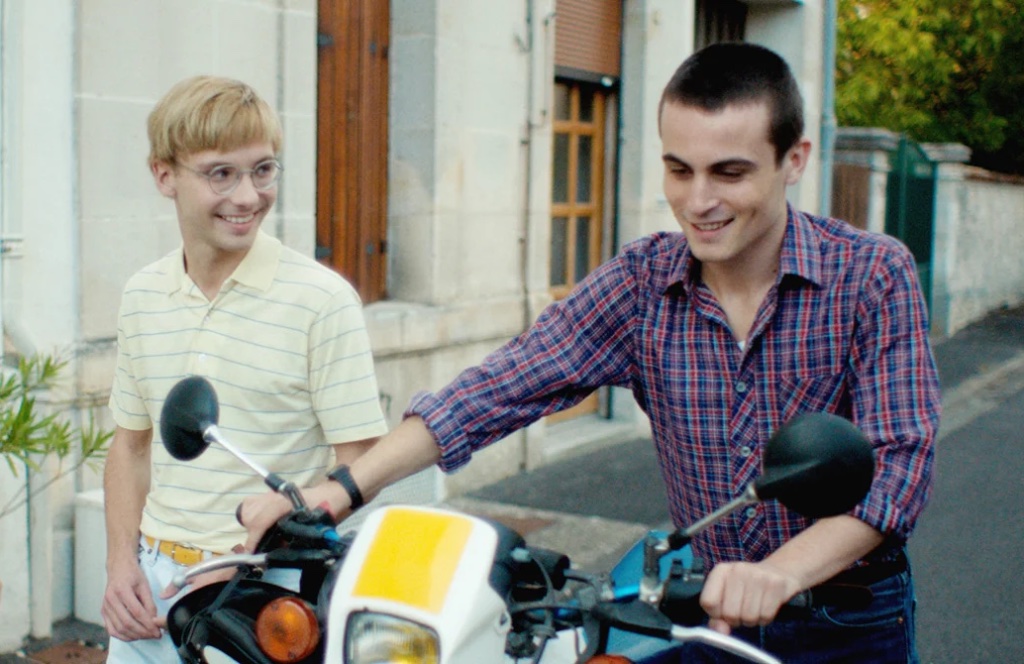
Adapting a much-loved novel for the big screen is always a fraught business: how do you keep the book’s readers happy while at the same time creating a piece that can stand on its own as a cinematic work? Philippe Besson’s hugely successful autobiographical novel Arrête avec Tes Mensonges (a review of the novel is included in my series on French literature, written during the Covid lockdown) has now inspired a new film by director Olivier Peyon.
Besson, who has written a number of screenplays himself, spoke of never wanting to write a script based on one of his own works when my colleague Paul Scott and I interviewed him recently. He explained that he sees the best-adapted versions as “beautiful betrayals,” something that the authors of the original texts can never achieve because they are unable to move far enough away from their own text. As Besson told us, “Movie directors must above all else bring to the film their own universe, their own intimacy.” In the case of Arrête avec Tes Mensonges, all he wanted for the film was that it have the same emotional impact at the end as it had in the book. After hearing Besson’s words on the matter, I was interested to see whether Peyon had indeed managed to make the movie his own while creating an appropriate emotional impression.
A number of reviews of the movie lazily speak of Peyon’s “fidelity” to the novel, but in fact, the director has made some radical changes to the original text. In the book, by far the largest part is devoted to the memories of the love affair that the bookish narrator (given the name of Stéphane Belcourt in the film) had with Thomas, who is half-Spanish and from a family of farmers, when both were 17. Two shorter sections are devoted to a much later time when the now-successful novelist encounters Thomas’s son, Lucas, at a book signing and again in Paris.
The greater part of the movie, by contrast, relates and reimagines the later meeting with Lucas, while the remembered love affair plays a crucial but smaller role. Peyon also transposes the action from the small Charente town of Barbezieux to the better-known Cognac, 35 kilometers down the road, where Belcourt has been invited to attend a weekend celebrating the brandy-producing region and to give a speech to various local dignitaries.
The flashbacks to the love affair between the two boys seem side-lined in the film by the somewhat manufactured meetings between Lucas, who in this version is in Cognac accompanying a group of American tourists, and Stéphane, but the intensity of the actors (Jérémy Gillet, whom some viewers may know from the series Mythomaniac on Netflix, as the young Stéphane, and Julien de Saint-Jean as the repressed Thomas) and the beauty of the images make these scenes feel both authentic and memorable.
Fortunately, the performances of Guillaume de Tonquédec as the older Stéphane (looking uncannily like Philippe Besson) and Victor Belmondo (sharing his famous grandfather’s natural screen charisma) in the role of Lucas make the occasionally clunky later episodes both engaging and watchable.
And I am pleased to report that the ending to the film does indeed meet Besson’s wish that it have a similar emotional impact as the book. Both end with a letter written by Thomas to Stéphane, but Peyon’s choice to weave into the narrative not only a photo of Thomas taken by the young Stéphane during their final meeting in the countryside (which plays an important part in the novel) but also photos of the natural surroundings, which we see Stéphane taking as he works up the courage to turn his camera onto Thomas for the first and only time, is a moving example of Peyon’s “beautiful betrayal” of the original text.
Here is a link for those interested in reading the first special volume of scholarly essays devoted to Philippe Besson, which includes Nick Hammond and Paul Scott’s interview with the novelist.
Favorite